25 Best Things to Do in Florence, Italy
- Oops!Something went wrong.Please try again later.
From Renaissance art to gelato shops, here's how locals recommend exploring the Tuscan capital.
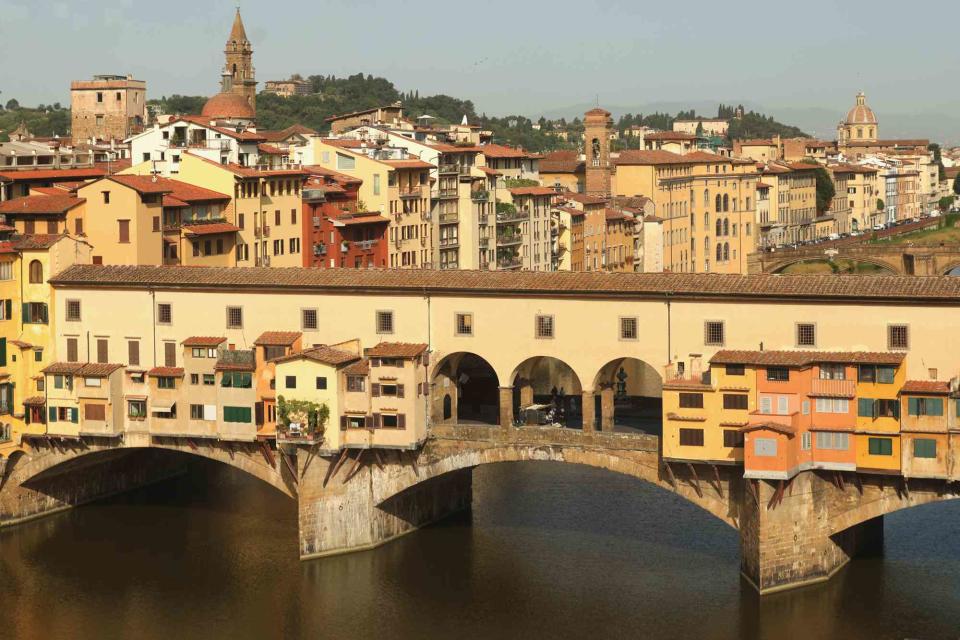
Chelsea Exton/Travel + Leisure
If a European getaway — the type where you spend your days museum hopping, visiting historical sites, drinking wine, and doubling your usual daily step count — sounds like your ideal next adventure, it's time to book a trip to Florence. The capital of Italy’s Tuscany region, Florence is known as the birthplace of the Renaissance, and it is still home to famous works by Michelangelo, Botticelli, and Leonardo da Vinci, among many artists of the same era.
Sara Pallabazzar, a guide with ToursByLocals, describes Florence as an “open-air museum" where you can experience “the enchantment of past centuries portrayed by works of art” everywhere you go. Adriano Pecoraro, head concierge at Villa San Michele, A Belmond Hotel, Florence, echoes this sentiment, noting that Firenze should be “discovered on foot.” That means you’ll want to pack your best travel shoes to navigate the architectural treasures inside Palazzo Vecchio or to make your way up the 463 steps of the Duomo — an iconic symbol of Florence that Pallabazzar says is “visible from every point in the city.”
Florence is bursting with beauty in the form of frescoed chapels, cobblestoned piazzas, and both natural and manmade masterpieces. There are so many sights to see and things to do, in fact, that it can be difficult to decide what to add to your itinerary. To help narrow it down, we asked a few Florentines to share their recommendations in one of the top cities in the world, as voted by Travel + Leisure readers in this year's World’s Best Awards.
And if you can’t fit everything into one trip, don't worry. “Florence, to me, is like New York City,” says Pallabazzar. “You always want to go back.” Read on to discover the 25 best things to do in Florence — whether you’re visiting for the very first time or returning for more Renaissance art, architecture, and unforgettable Italian dishes.
Head to the city's historic center.
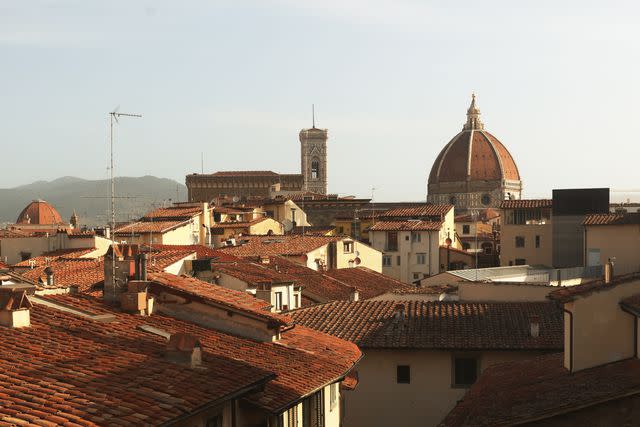
Chelsea Exton/Travel + Leisure
Pallabazzar recommends seeing the historic center of Florence at different times of the day. In the early morning, you’ll get to experience it “without noise and the pressing pace of crowds.” Midday brings droves of visitors, but the destination is “bathed in sunshine.” In the evening, “the lights of the street lamps stretch out over the Lungarni, creating a truly magical effect.”
Visit the Uffizi Gallery.
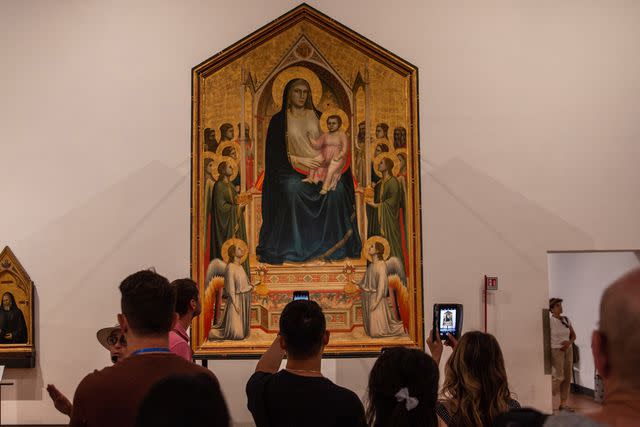
Christopher Larson/Travel + Leisure
The Uffizi Gallery “is a great way to comprehend the genius and the importance of the Medici family, and why Florentines are so proud of their history,” says Pecoraro. “[It’s a] treasure chest of beauty that preserves works of art from the late 1200s to the Baroque, along with an amazing collection of marble groups from the classical period,” adds Pallabazzar. Famous works inside the Uffizi Gallery include Titian’s "Venus of Urbino" and Botticelli’s "The Birth of Venus" and "Primavera."
Discover the work of Florentine artisans.
“Florence is world-renowned for its high-end craftsmanship, manufacturing know-how, and creativity," says Pecoraro. "The art of handcraft and the ability of creation is what made Florence shine in Europe during [the] Renaissance.” To provide travelers with a deeper understanding of these manual traditions, Villa San Michele offers an "Art of Making” tour, where guests uncover lesser-known Florentine creations, including jewelry, bow ties, eyewear, crystalware, hats, artisanal perfumery, and pottery.
Check into one of the city’s most opulent hotels.
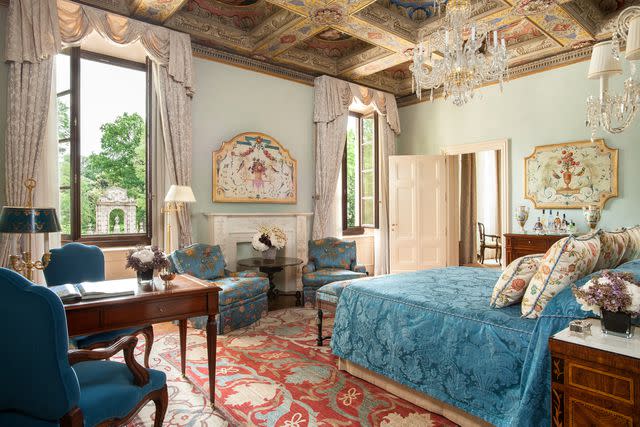
Courtesy of Four Seasons
After a long day exploring the city, you’ll want to return to a luxurious, comfortable, and far-from-minimalist room — you are in Florence, after all. In our annual “World’s Best Awards” survey for 2023, T+L readers voted The St. Regis Florence, Helvetia & Bristol Firenze, Hotel Savoy, a Rocco Forte Hotel, Four Seasons Hotel Firenze, and Brunelleschi Hotel as the top five properties in the city.
Enjoy a bistecca alla Fiorentina.
Max Musto, general manager of Four Seasons Hotel Firenze, describes the bistecca alla Fiorentina as a “mouthwatering T-bone steak cooked over an open flame, seasoned with just a touch of olive oil, salt, and pepper.” The dish was recommended by several of our experts; Pallabazzar suggests making a restaurant reservation in advance if you're dreaming of eating a massive Florentine steak. “Real steak is not to be found in the city, or displayed in plain sight in the store window," she says. "You need to go to the countryside, to Greve in Chianti, for example, or Lastra a Signa."
Appreciate Michelangelo's work inside the Medici Chapels.
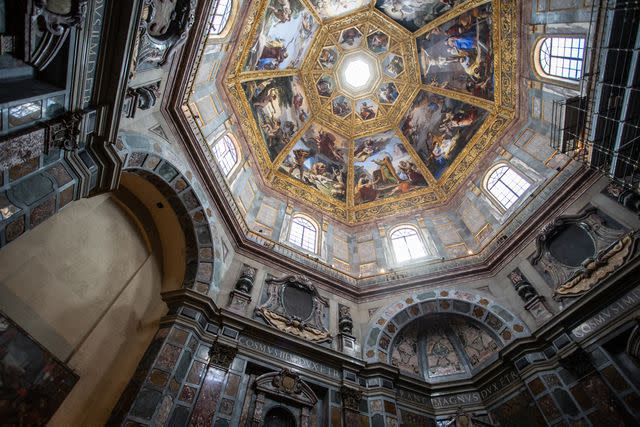
Christopher Larson/Travel + Leisure
The Medici Chapels are part of the San Lorenzo complex — where you’ll also find the Basilica of San Lorenzo — and the burial ground for the members of the Medici family. Michelangelo’s influence is ever-present, as he worked on the mausoleum, the New Sacristy, before leaving for Rome in 1534.
See the city from Piazzale Michelangelo.
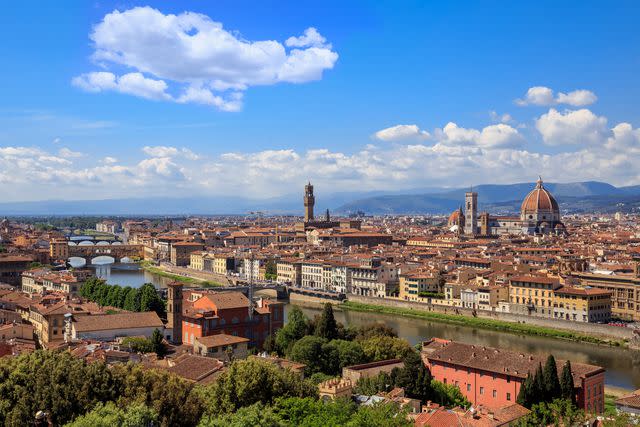
Fani Kurti/Getty Images
“One of the best locations to watch Florence from the top hills is Piazzale Michelangelo,” says Ruggero Vannini, head concierge at Hotel Savoy. But, he warns, it can be crowded. As an alternative, he suggests heading to the town of Fiesole for a similar perspective.
Dine at a local trattoria.

Chelsea Exton/Travel + Leisure
“Dining at one of the many Florentine trattorias is the best way to dive into a timeless local social experience,” says Pecoraro. To get you started, he recommends Buca Lapi, Trattoria Cammillo, and Trattoria 13 Gobbi.
Find all of the Davids.
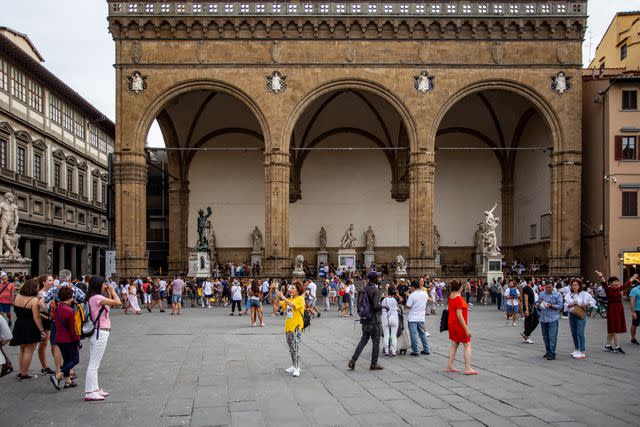
Christopher Larson/Travel + Leisure
Travelers interested in art should plan out what Pallabazzar calls “the David experience.” This begins with the Piazza della Signoria to see the replica of Michelangelo’s David, followed by The Bargello, where the bronze Davids by Verrocchio and Donatello are housed. Finally, she says, you’ll reach the Accademia Gallery and Michelangelo’s David, a figure “celebrated by Renaissance artists” and one “that reminds us of lost Florentine freedom.”
Cheers over Negronis.
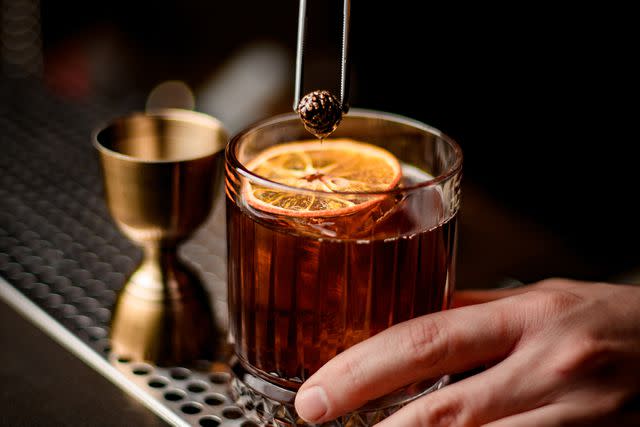
MaximFesenko/Getty Images
Florence is the birthplace of the Negroni, so sipping one (or two) is a must. In fact, “[enjoying] aperitivo at sunset with a view” tops Percoraro’s list of the best things to do while in the city.
Visit Museo di San Marco.
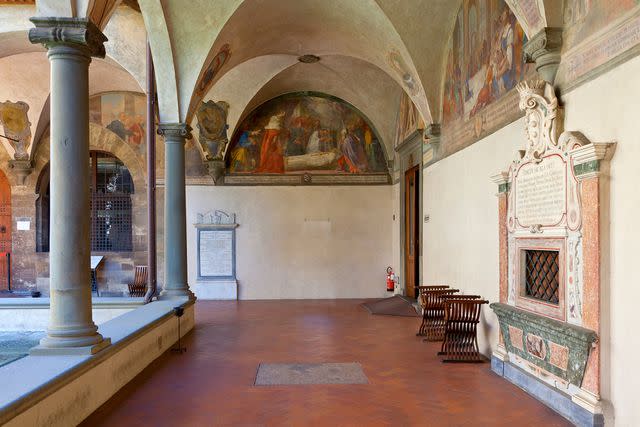
Sylvain Sonnet/Getty Images
This still-functioning monastery was designed by architect Michelozzo in the 15th century. Today, visitors come to Museo di San Marco for the frescoes and panels by Fra Angelico, as well as its courtyard, cloisters, palazzo, and garden.
Climb Brunelleschi's dome.

Chelsea Exton/Travel + Leisure
The Florence Cathedral (or Duomo) is composed of six separate parts, two of which are the cathedral itself — which was formerly known as the Cathedral of Santa Maria del Fiore — and Brunelleschi's dome. “One cannot help but tackle the 463 steps to reach the lantern at the top of Brunelleschi's dome," says Pallabazzar. From here, climbers "enjoy a breathtaking view of Florence's rooftops.”
See the Ponte Vecchio from the water.
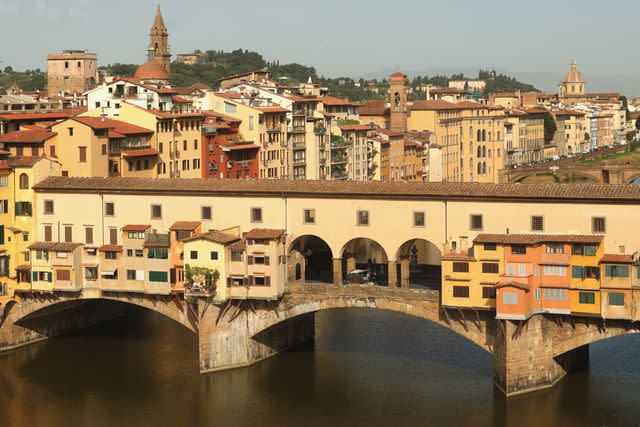
Chelsea Exton/Travel + Leisure
Translated as “Old Bridge,” the Ponte Vecchio is one of the most well-known images associated with Florence. To get a picture-perfect moment, head out on the river Arno. “A unique way to have a sense of the city as a whole is to navigate the Arno river in a typical wooden boat guided by the ‘Renaioli,’ romantically sliding their boats under the city's most famous and ancient bridges,” says Musto.
Venture into the Oltrarno district.
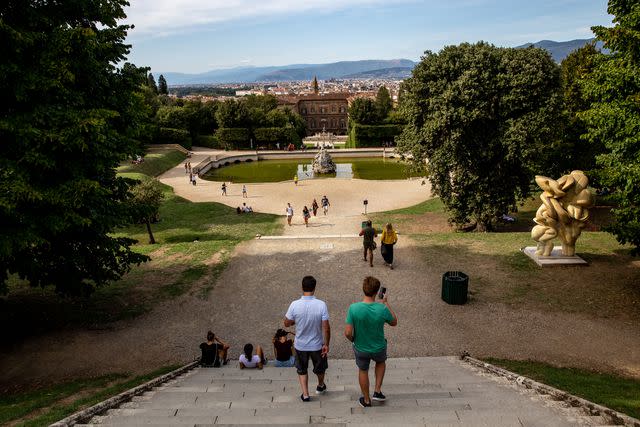
Christopher Larson/Travel + Leisure
“If you want to discover an alternative Florence, tour the Oltrarno district, the area on the left bank of the Arno river,” says Vannini. Here, he says, “an atmosphere of the old neighborhood” is preserved. Two of the more famous sites within the district are Pitti Palace, Boboli Gardens, and Bardini Garden — more on that below.
Stroll through the Bardini and Boboli Gardens.
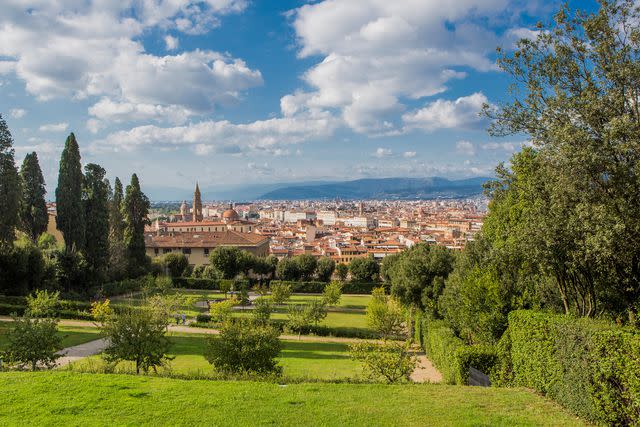
Massimo Borchi/Atlantide Phototravel/Getty Images
Florentine art and architecture also extend to the city’s green spaces and gardens. Behind the Pitti Palace sits Boboli Gardens, which Vannini describes as “one of the largest and most elegant Italian-style gardens.” Bardini Garden is Also on his must-do list. “The Bardini Garden offers wonderful views of Florence from its four hectares of parkland between the left bank of the Arno River, Montecuccoli Hill, and the medieval wall,” he says.
Make your own perfume at AquaFlor Firenze.
If you want a special souvenir you can use and appreciate long after you've left Italy, register for a session at AquaFlor Firenze. Located in a historic Renaissance palace, the hour-long class allows guests to create their own signature scent and take it home in a 100-milliliter bottle.
Leave the city on a bicycle or Vespa.
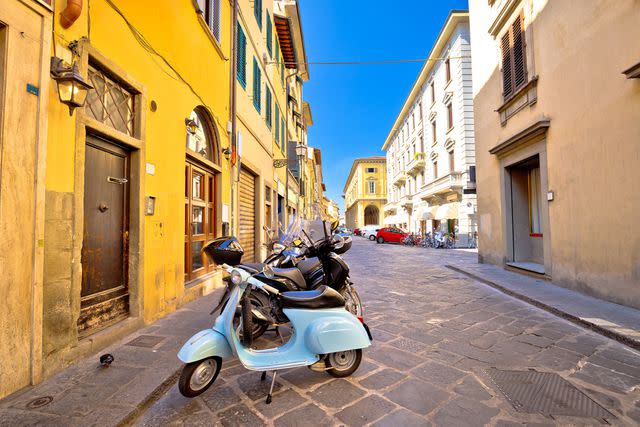
xbrchx/Getty Images
At some point during your trip, Pecoraro suggests journeying to the outskirts of the city, either by bike or scooter. “From Fiesole to Settignano to Maiano, from Forte Belvedere to Poggio Imperiale to Castello — these areas hide incredible treasures, such as ancient charming villas, inspiring historical gardens, vineyard scenarios, and a profound sense of poetry and love,” he says.
Have a glass of Chianti Classico.
According to Pallabazzar, there’s one red you absolutely need to try when in Florence. “Chianti Classico is different from regular Chianti, as it is made from grapes that grow in sandier soils, which makes it lighter than the regular,” she says. “The flavor is strong and robust, and the ruby color [is] very well suited to meats and cured meats.”
Walk through Corridoio Vasariano.
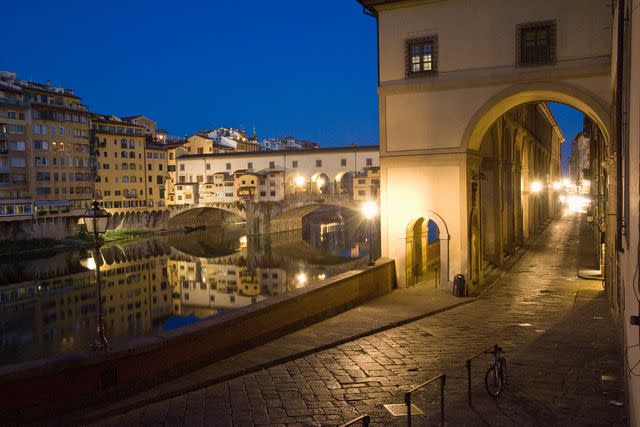
Atlantide Phototravel/Getty Images
“Imagine strolling above the bustling streets of Florence on a hidden passage that was built for royalty,” says Musto. Referring to Corridoio Vasariano, he explains that the “architectural marvel” offers a “glimpse into the past as you tread the same path that once connected the Medici rulers to their offices and residence.” Though closed since 2016, the site is slated to reopen in late 2023.
Make a stop at Palazzo Vecchio.
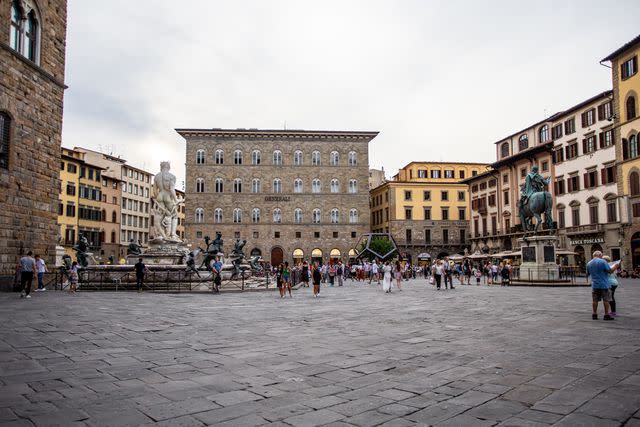
Christopher Larson/Travel + Leisure
The town hall of Florence, Palazzo Vecchio is an amazing example of Renaissance architecture. Statues by Donatello, Michelangelo, and Giorgio Vasari dot the exterior, and the interior is equally incredible. Inside, you’ll see the private studio of Francesco I de' Medici and the largest room in Florence, the “Salone dei Cinquecento," among other wonders.
Have a lampredotto for lunch.
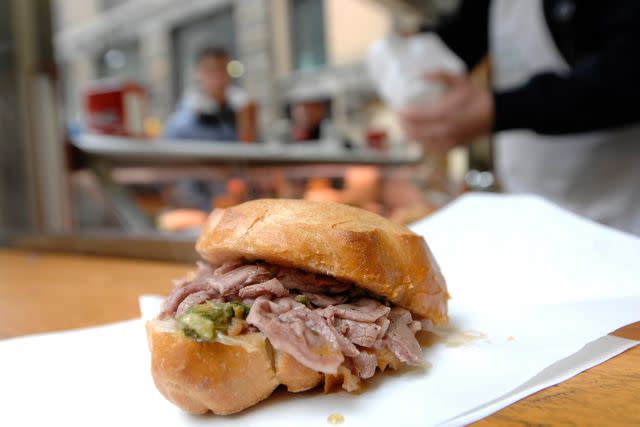
FRANCESCO VIGNALI/Getty Images
Alongside the Florentine steak, Vannini says you can’t miss the panino al lampredotto. “The lampredotto panino is more than just a simple street food — it’s an institution," he explains. "Eating a lampredotto panino means having a genuine experience with Florentine sauce (literally). It is a dish that embodies the spirit of the city — and more generally, that of Tuscany — in food form."
Sign up for a pasta-making class.

DisobeyArt/Getty Images
When in Italy, right? Anyone fascinated by the culinary side of Florence will enjoy learning classic pasta recipes and pasta-making techniques in person. Check out Pasta Class Florence and Riva Lofts for hands-on courses.
Visit Basilica di Santa Croce.
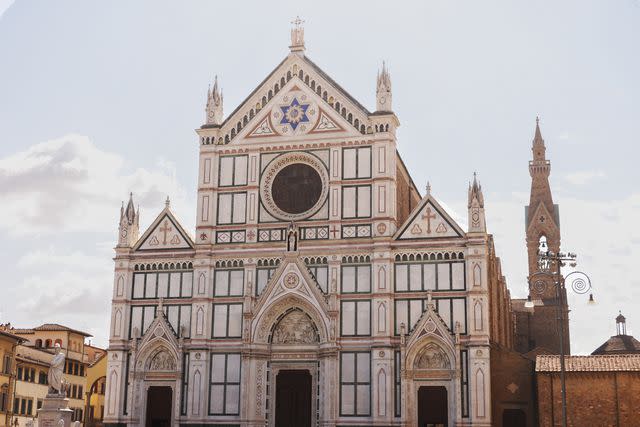
Chelsea Exton/Travel + Leisure
Many famous names, including Michelangelo and Galileo, now rest in the Basilica di Santa Croce, which is also known as the “Pantheon of Florence.” There are 16 total chapels inside; the Capella de Pazzi, credited to Brunelleschi, is the most famous.
Taste dishes that combine bread and tomatoes.
Pappa al pomodoro and panzanella are two tomato and bread-based Tuscan dishes to try during your trip. Pallabazzar calls the latter a “recovery salad,” one made with soaked (then squeezed) bread, tomatoes, cucumbers, red onion, extra virgin olive oil, salt, and pepper. Pappa al pomodoro, on the other hand, is more of a tomato and bread soup. “Made with simple ingredients such as ripe tomatoes, stale bread, olive oil, garlic, and fresh basil, this dish beautifully captures the essence of Italian comfort food,” says Musto. "It's a flavorful choice, especially on a cooler day."
End your day with gelato.
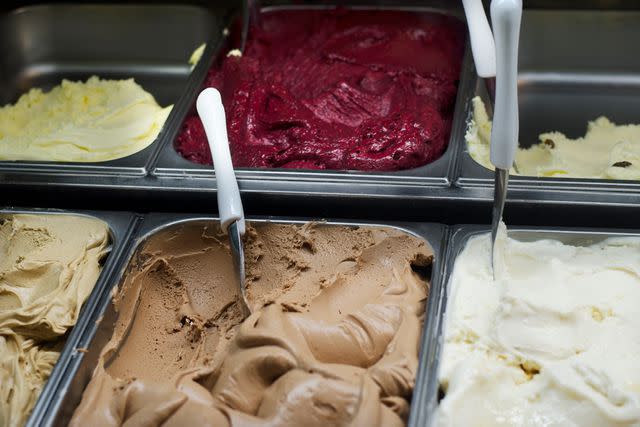
Mitch Diamond/Getty Images
There’s nothing better than a cold treat after a day exploring the streets, art, and buildings of Florence. Pallabazzar recommends Vivoli's or Antica Gelateria Fiorentina in Via Faenza, “where you can still taste Buontalenti, a [flavor] invented for the Medici."
For more Travel & Leisure news, make sure to sign up for our newsletter!
Read the original article on Travel & Leisure.
